Leadership Challenge Analysis and Reflection
VerifiedAdded on 2020/03/16
|12
|3105
|112
AI Summary
This assignment delves into a personal reflection on a leadership challenge. The author identifies their strengths, including communication skills, creativity, confidence, and a positive attitude. However, they also acknowledge weaknesses in managing multicultural teams, lacking social skills and empathy, and struggling with multitasking due to anxiety. The analysis culminates in the development of strategies to overcome these weaknesses by setting SMART objectives, seeking targeted training, and engaging in personal growth initiatives.
Contribute Materials
Your contribution can guide someone’s learning journey. Share your
documents today.
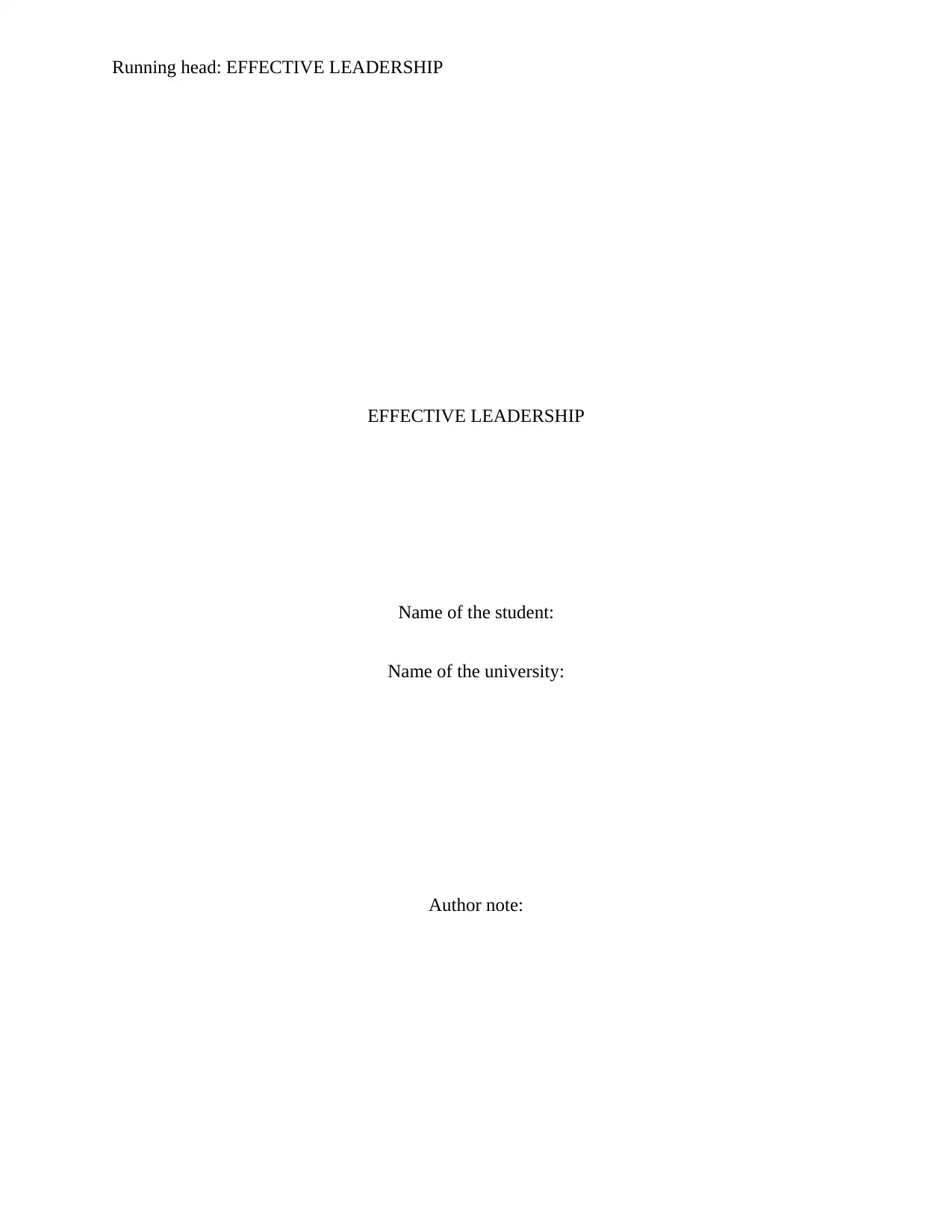
Running head: EFFECTIVE LEADERSHIP
EFFECTIVE LEADERSHIP
Name of the student:
Name of the university:
Author note:
EFFECTIVE LEADERSHIP
Name of the student:
Name of the university:
Author note:
Secure Best Marks with AI Grader
Need help grading? Try our AI Grader for instant feedback on your assignments.

1
EFFECTIVE LEADERSHIP
Introduction:
Leaders are the individuals who have the responsibility of developing the path through which
other members of the team would easily attend their organizational goals and be benefitted in
their career. They are responsible for setting the direction for the team members, help in building
an inspiring vision and also create some new innovative options which help in meeting the
organizational goals easily (Odomeru and Ogdobonna 2013). By their commitment towards
organization and also to their team members, they sought to take the position of guides (Wang et
al. 2014). They need to possess important leadership skills which help them to lead the teams
properly. This assignment has helped me to realize some of my strengths and weakness as leader
and therefore I have jotted down the strategies that I will take to overcome the weakness and
emerge as an efficient leader.
Strengths of leadership:
Communication:
Of the different strengths that I have identified form the leadership challenge is that I
have strong communication skills. Speaking clearly to the team members and in effective tone
and body language is very important (Li, Mobley and Kelly 2013). While communicating, I
noticed that I was able to rightly follow the tone which was not dominant but was capable
enough to instill excitement among the team members in achieving the goals. I noticed that I
have well developed listening skills which helped my team mates to express themselves
properly. Their innovative ideas were taken by me as effective feedback which is also applied
together along with my own knowledge so that they also feel respected and loved by the
organization. I gave them enough scope to maintain transparency and open mindedness in their
EFFECTIVE LEADERSHIP
Introduction:
Leaders are the individuals who have the responsibility of developing the path through which
other members of the team would easily attend their organizational goals and be benefitted in
their career. They are responsible for setting the direction for the team members, help in building
an inspiring vision and also create some new innovative options which help in meeting the
organizational goals easily (Odomeru and Ogdobonna 2013). By their commitment towards
organization and also to their team members, they sought to take the position of guides (Wang et
al. 2014). They need to possess important leadership skills which help them to lead the teams
properly. This assignment has helped me to realize some of my strengths and weakness as leader
and therefore I have jotted down the strategies that I will take to overcome the weakness and
emerge as an efficient leader.
Strengths of leadership:
Communication:
Of the different strengths that I have identified form the leadership challenge is that I
have strong communication skills. Speaking clearly to the team members and in effective tone
and body language is very important (Li, Mobley and Kelly 2013). While communicating, I
noticed that I was able to rightly follow the tone which was not dominant but was capable
enough to instill excitement among the team members in achieving the goals. I noticed that I
have well developed listening skills which helped my team mates to express themselves
properly. Their innovative ideas were taken by me as effective feedback which is also applied
together along with my own knowledge so that they also feel respected and loved by the
organization. I gave them enough scope to maintain transparency and open mindedness in their
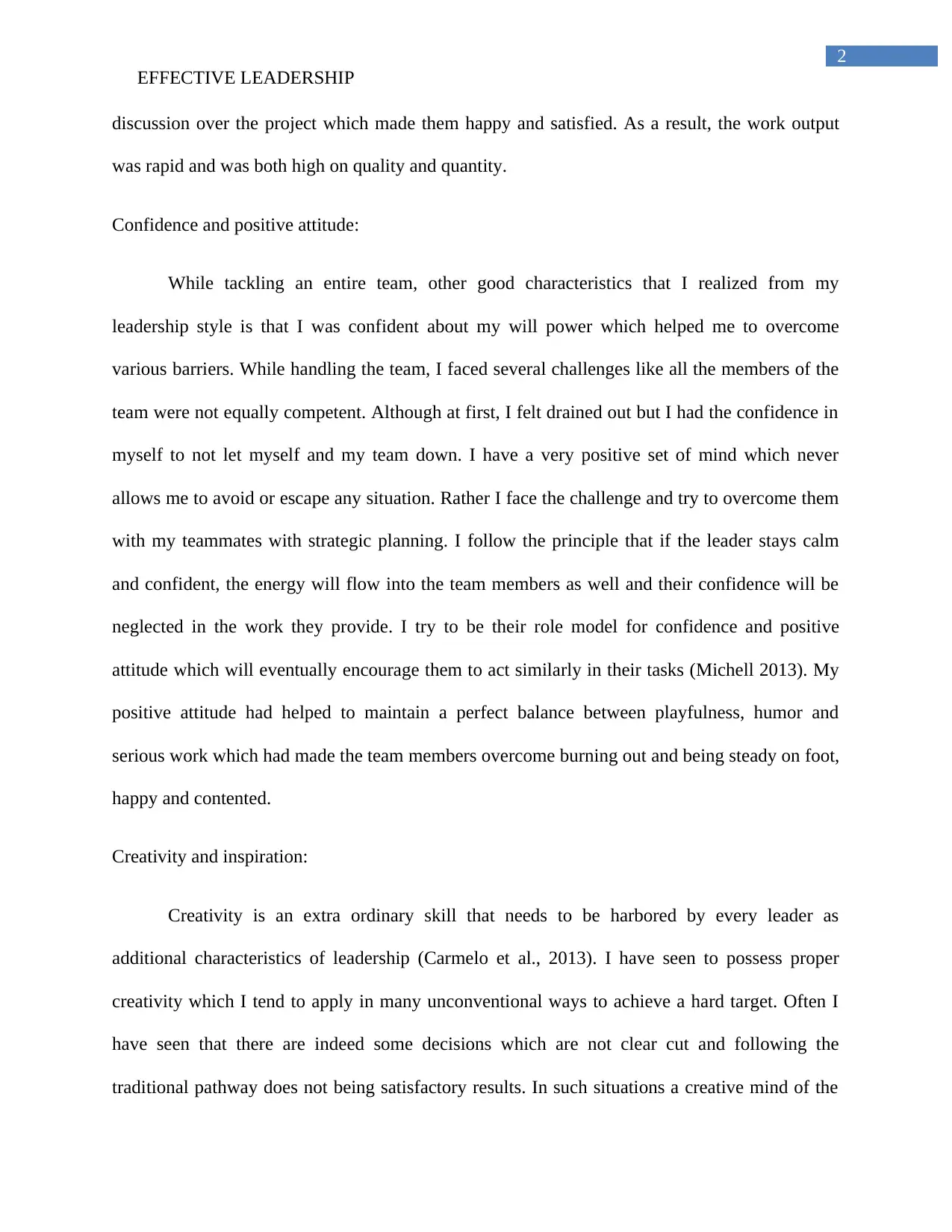
2
EFFECTIVE LEADERSHIP
discussion over the project which made them happy and satisfied. As a result, the work output
was rapid and was both high on quality and quantity.
Confidence and positive attitude:
While tackling an entire team, other good characteristics that I realized from my
leadership style is that I was confident about my will power which helped me to overcome
various barriers. While handling the team, I faced several challenges like all the members of the
team were not equally competent. Although at first, I felt drained out but I had the confidence in
myself to not let myself and my team down. I have a very positive set of mind which never
allows me to avoid or escape any situation. Rather I face the challenge and try to overcome them
with my teammates with strategic planning. I follow the principle that if the leader stays calm
and confident, the energy will flow into the team members as well and their confidence will be
neglected in the work they provide. I try to be their role model for confidence and positive
attitude which will eventually encourage them to act similarly in their tasks (Michell 2013). My
positive attitude had helped to maintain a perfect balance between playfulness, humor and
serious work which had made the team members overcome burning out and being steady on foot,
happy and contented.
Creativity and inspiration:
Creativity is an extra ordinary skill that needs to be harbored by every leader as
additional characteristics of leadership (Carmelo et al., 2013). I have seen to possess proper
creativity which I tend to apply in many unconventional ways to achieve a hard target. Often I
have seen that there are indeed some decisions which are not clear cut and following the
traditional pathway does not being satisfactory results. In such situations a creative mind of the
EFFECTIVE LEADERSHIP
discussion over the project which made them happy and satisfied. As a result, the work output
was rapid and was both high on quality and quantity.
Confidence and positive attitude:
While tackling an entire team, other good characteristics that I realized from my
leadership style is that I was confident about my will power which helped me to overcome
various barriers. While handling the team, I faced several challenges like all the members of the
team were not equally competent. Although at first, I felt drained out but I had the confidence in
myself to not let myself and my team down. I have a very positive set of mind which never
allows me to avoid or escape any situation. Rather I face the challenge and try to overcome them
with my teammates with strategic planning. I follow the principle that if the leader stays calm
and confident, the energy will flow into the team members as well and their confidence will be
neglected in the work they provide. I try to be their role model for confidence and positive
attitude which will eventually encourage them to act similarly in their tasks (Michell 2013). My
positive attitude had helped to maintain a perfect balance between playfulness, humor and
serious work which had made the team members overcome burning out and being steady on foot,
happy and contented.
Creativity and inspiration:
Creativity is an extra ordinary skill that needs to be harbored by every leader as
additional characteristics of leadership (Carmelo et al., 2013). I have seen to possess proper
creativity which I tend to apply in many unconventional ways to achieve a hard target. Often I
have seen that there are indeed some decisions which are not clear cut and following the
traditional pathway does not being satisfactory results. In such situations a creative mind of the
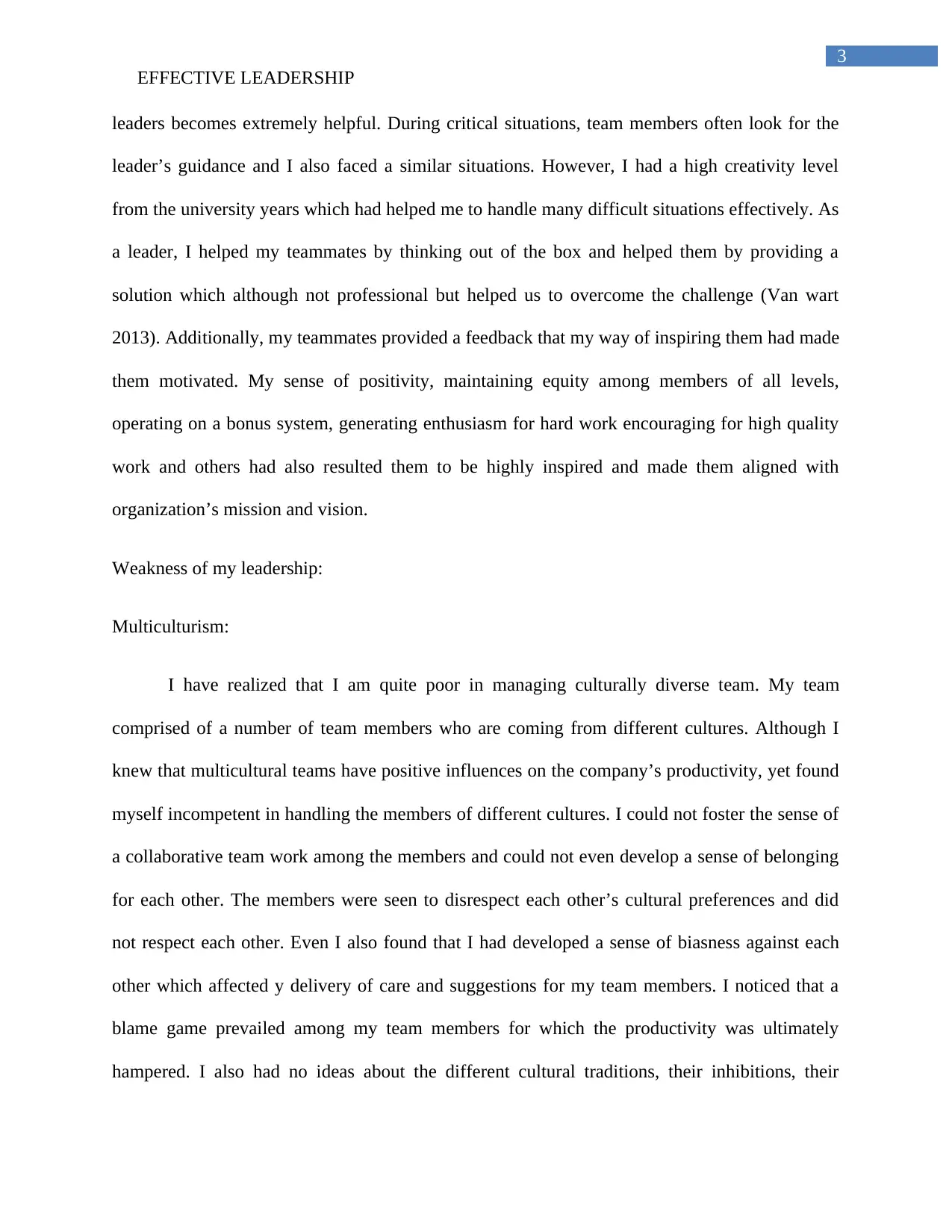
3
EFFECTIVE LEADERSHIP
leaders becomes extremely helpful. During critical situations, team members often look for the
leader’s guidance and I also faced a similar situations. However, I had a high creativity level
from the university years which had helped me to handle many difficult situations effectively. As
a leader, I helped my teammates by thinking out of the box and helped them by providing a
solution which although not professional but helped us to overcome the challenge (Van wart
2013). Additionally, my teammates provided a feedback that my way of inspiring them had made
them motivated. My sense of positivity, maintaining equity among members of all levels,
operating on a bonus system, generating enthusiasm for hard work encouraging for high quality
work and others had also resulted them to be highly inspired and made them aligned with
organization’s mission and vision.
Weakness of my leadership:
Multiculturism:
I have realized that I am quite poor in managing culturally diverse team. My team
comprised of a number of team members who are coming from different cultures. Although I
knew that multicultural teams have positive influences on the company’s productivity, yet found
myself incompetent in handling the members of different cultures. I could not foster the sense of
a collaborative team work among the members and could not even develop a sense of belonging
for each other. The members were seen to disrespect each other’s cultural preferences and did
not respect each other. Even I also found that I had developed a sense of biasness against each
other which affected y delivery of care and suggestions for my team members. I noticed that a
blame game prevailed among my team members for which the productivity was ultimately
hampered. I also had no ideas about the different cultural traditions, their inhibitions, their
EFFECTIVE LEADERSHIP
leaders becomes extremely helpful. During critical situations, team members often look for the
leader’s guidance and I also faced a similar situations. However, I had a high creativity level
from the university years which had helped me to handle many difficult situations effectively. As
a leader, I helped my teammates by thinking out of the box and helped them by providing a
solution which although not professional but helped us to overcome the challenge (Van wart
2013). Additionally, my teammates provided a feedback that my way of inspiring them had made
them motivated. My sense of positivity, maintaining equity among members of all levels,
operating on a bonus system, generating enthusiasm for hard work encouraging for high quality
work and others had also resulted them to be highly inspired and made them aligned with
organization’s mission and vision.
Weakness of my leadership:
Multiculturism:
I have realized that I am quite poor in managing culturally diverse team. My team
comprised of a number of team members who are coming from different cultures. Although I
knew that multicultural teams have positive influences on the company’s productivity, yet found
myself incompetent in handling the members of different cultures. I could not foster the sense of
a collaborative team work among the members and could not even develop a sense of belonging
for each other. The members were seen to disrespect each other’s cultural preferences and did
not respect each other. Even I also found that I had developed a sense of biasness against each
other which affected y delivery of care and suggestions for my team members. I noticed that a
blame game prevailed among my team members for which the productivity was ultimately
hampered. I also had no ideas about the different cultural traditions, their inhibitions, their
Secure Best Marks with AI Grader
Need help grading? Try our AI Grader for instant feedback on your assignments.
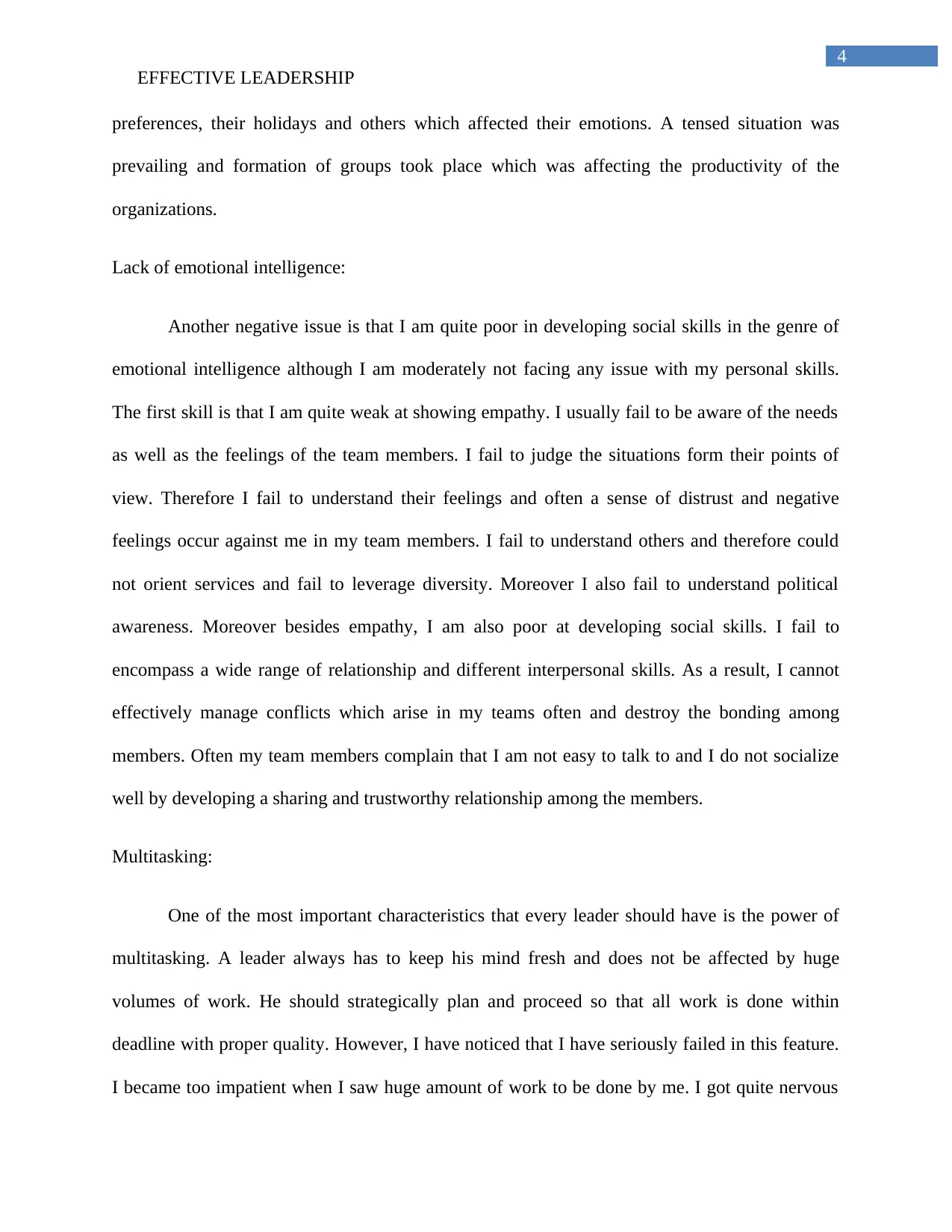
4
EFFECTIVE LEADERSHIP
preferences, their holidays and others which affected their emotions. A tensed situation was
prevailing and formation of groups took place which was affecting the productivity of the
organizations.
Lack of emotional intelligence:
Another negative issue is that I am quite poor in developing social skills in the genre of
emotional intelligence although I am moderately not facing any issue with my personal skills.
The first skill is that I am quite weak at showing empathy. I usually fail to be aware of the needs
as well as the feelings of the team members. I fail to judge the situations form their points of
view. Therefore I fail to understand their feelings and often a sense of distrust and negative
feelings occur against me in my team members. I fail to understand others and therefore could
not orient services and fail to leverage diversity. Moreover I also fail to understand political
awareness. Moreover besides empathy, I am also poor at developing social skills. I fail to
encompass a wide range of relationship and different interpersonal skills. As a result, I cannot
effectively manage conflicts which arise in my teams often and destroy the bonding among
members. Often my team members complain that I am not easy to talk to and I do not socialize
well by developing a sharing and trustworthy relationship among the members.
Multitasking:
One of the most important characteristics that every leader should have is the power of
multitasking. A leader always has to keep his mind fresh and does not be affected by huge
volumes of work. He should strategically plan and proceed so that all work is done within
deadline with proper quality. However, I have noticed that I have seriously failed in this feature.
I became too impatient when I saw huge amount of work to be done by me. I got quite nervous
EFFECTIVE LEADERSHIP
preferences, their holidays and others which affected their emotions. A tensed situation was
prevailing and formation of groups took place which was affecting the productivity of the
organizations.
Lack of emotional intelligence:
Another negative issue is that I am quite poor in developing social skills in the genre of
emotional intelligence although I am moderately not facing any issue with my personal skills.
The first skill is that I am quite weak at showing empathy. I usually fail to be aware of the needs
as well as the feelings of the team members. I fail to judge the situations form their points of
view. Therefore I fail to understand their feelings and often a sense of distrust and negative
feelings occur against me in my team members. I fail to understand others and therefore could
not orient services and fail to leverage diversity. Moreover I also fail to understand political
awareness. Moreover besides empathy, I am also poor at developing social skills. I fail to
encompass a wide range of relationship and different interpersonal skills. As a result, I cannot
effectively manage conflicts which arise in my teams often and destroy the bonding among
members. Often my team members complain that I am not easy to talk to and I do not socialize
well by developing a sharing and trustworthy relationship among the members.
Multitasking:
One of the most important characteristics that every leader should have is the power of
multitasking. A leader always has to keep his mind fresh and does not be affected by huge
volumes of work. He should strategically plan and proceed so that all work is done within
deadline with proper quality. However, I have noticed that I have seriously failed in this feature.
I became too impatient when I saw huge amount of work to be done by me. I got quite nervous
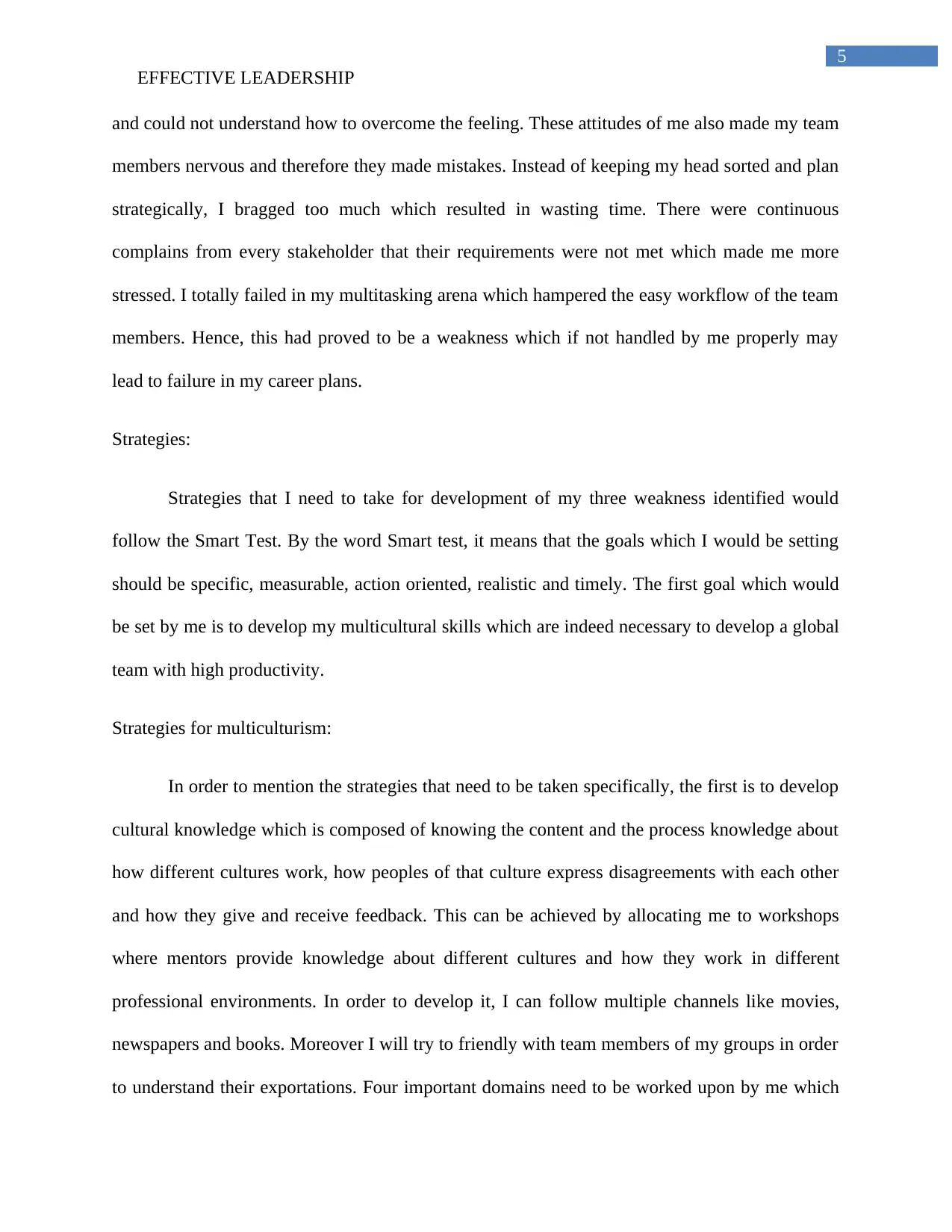
5
EFFECTIVE LEADERSHIP
and could not understand how to overcome the feeling. These attitudes of me also made my team
members nervous and therefore they made mistakes. Instead of keeping my head sorted and plan
strategically, I bragged too much which resulted in wasting time. There were continuous
complains from every stakeholder that their requirements were not met which made me more
stressed. I totally failed in my multitasking arena which hampered the easy workflow of the team
members. Hence, this had proved to be a weakness which if not handled by me properly may
lead to failure in my career plans.
Strategies:
Strategies that I need to take for development of my three weakness identified would
follow the Smart Test. By the word Smart test, it means that the goals which I would be setting
should be specific, measurable, action oriented, realistic and timely. The first goal which would
be set by me is to develop my multicultural skills which are indeed necessary to develop a global
team with high productivity.
Strategies for multiculturism:
In order to mention the strategies that need to be taken specifically, the first is to develop
cultural knowledge which is composed of knowing the content and the process knowledge about
how different cultures work, how peoples of that culture express disagreements with each other
and how they give and receive feedback. This can be achieved by allocating me to workshops
where mentors provide knowledge about different cultures and how they work in different
professional environments. In order to develop it, I can follow multiple channels like movies,
newspapers and books. Moreover I will try to friendly with team members of my groups in order
to understand their exportations. Four important domains need to be worked upon by me which
EFFECTIVE LEADERSHIP
and could not understand how to overcome the feeling. These attitudes of me also made my team
members nervous and therefore they made mistakes. Instead of keeping my head sorted and plan
strategically, I bragged too much which resulted in wasting time. There were continuous
complains from every stakeholder that their requirements were not met which made me more
stressed. I totally failed in my multitasking arena which hampered the easy workflow of the team
members. Hence, this had proved to be a weakness which if not handled by me properly may
lead to failure in my career plans.
Strategies:
Strategies that I need to take for development of my three weakness identified would
follow the Smart Test. By the word Smart test, it means that the goals which I would be setting
should be specific, measurable, action oriented, realistic and timely. The first goal which would
be set by me is to develop my multicultural skills which are indeed necessary to develop a global
team with high productivity.
Strategies for multiculturism:
In order to mention the strategies that need to be taken specifically, the first is to develop
cultural knowledge which is composed of knowing the content and the process knowledge about
how different cultures work, how peoples of that culture express disagreements with each other
and how they give and receive feedback. This can be achieved by allocating me to workshops
where mentors provide knowledge about different cultures and how they work in different
professional environments. In order to develop it, I can follow multiple channels like movies,
newspapers and books. Moreover I will try to friendly with team members of my groups in order
to understand their exportations. Four important domains need to be worked upon by me which
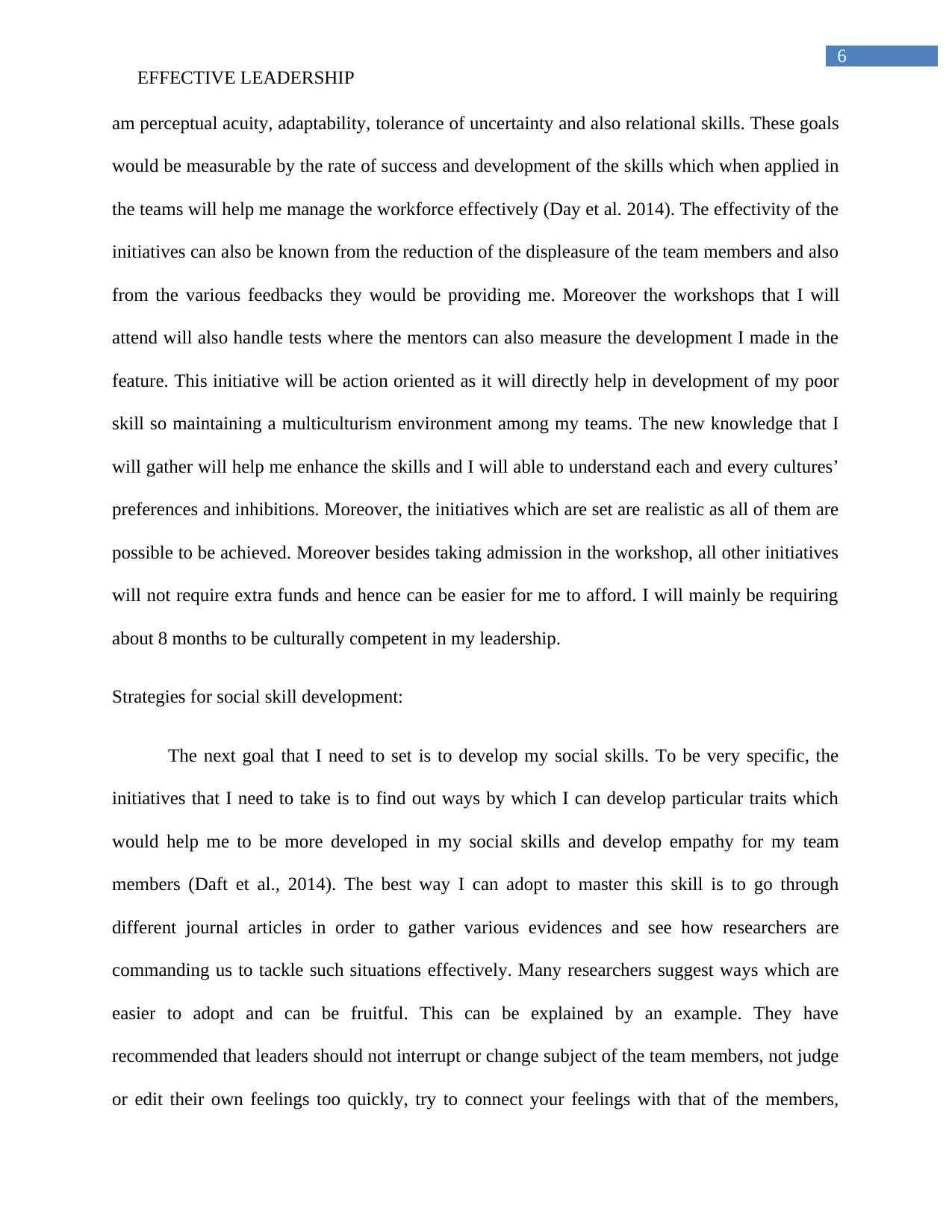
6
EFFECTIVE LEADERSHIP
am perceptual acuity, adaptability, tolerance of uncertainty and also relational skills. These goals
would be measurable by the rate of success and development of the skills which when applied in
the teams will help me manage the workforce effectively (Day et al. 2014). The effectivity of the
initiatives can also be known from the reduction of the displeasure of the team members and also
from the various feedbacks they would be providing me. Moreover the workshops that I will
attend will also handle tests where the mentors can also measure the development I made in the
feature. This initiative will be action oriented as it will directly help in development of my poor
skill so maintaining a multiculturism environment among my teams. The new knowledge that I
will gather will help me enhance the skills and I will able to understand each and every cultures’
preferences and inhibitions. Moreover, the initiatives which are set are realistic as all of them are
possible to be achieved. Moreover besides taking admission in the workshop, all other initiatives
will not require extra funds and hence can be easier for me to afford. I will mainly be requiring
about 8 months to be culturally competent in my leadership.
Strategies for social skill development:
The next goal that I need to set is to develop my social skills. To be very specific, the
initiatives that I need to take is to find out ways by which I can develop particular traits which
would help me to be more developed in my social skills and develop empathy for my team
members (Daft et al., 2014). The best way I can adopt to master this skill is to go through
different journal articles in order to gather various evidences and see how researchers are
commanding us to tackle such situations effectively. Many researchers suggest ways which are
easier to adopt and can be fruitful. This can be explained by an example. They have
recommended that leaders should not interrupt or change subject of the team members, not judge
or edit their own feelings too quickly, try to connect your feelings with that of the members,
EFFECTIVE LEADERSHIP
am perceptual acuity, adaptability, tolerance of uncertainty and also relational skills. These goals
would be measurable by the rate of success and development of the skills which when applied in
the teams will help me manage the workforce effectively (Day et al. 2014). The effectivity of the
initiatives can also be known from the reduction of the displeasure of the team members and also
from the various feedbacks they would be providing me. Moreover the workshops that I will
attend will also handle tests where the mentors can also measure the development I made in the
feature. This initiative will be action oriented as it will directly help in development of my poor
skill so maintaining a multiculturism environment among my teams. The new knowledge that I
will gather will help me enhance the skills and I will able to understand each and every cultures’
preferences and inhibitions. Moreover, the initiatives which are set are realistic as all of them are
possible to be achieved. Moreover besides taking admission in the workshop, all other initiatives
will not require extra funds and hence can be easier for me to afford. I will mainly be requiring
about 8 months to be culturally competent in my leadership.
Strategies for social skill development:
The next goal that I need to set is to develop my social skills. To be very specific, the
initiatives that I need to take is to find out ways by which I can develop particular traits which
would help me to be more developed in my social skills and develop empathy for my team
members (Daft et al., 2014). The best way I can adopt to master this skill is to go through
different journal articles in order to gather various evidences and see how researchers are
commanding us to tackle such situations effectively. Many researchers suggest ways which are
easier to adopt and can be fruitful. This can be explained by an example. They have
recommended that leaders should not interrupt or change subject of the team members, not judge
or edit their own feelings too quickly, try to connect your feelings with that of the members,
Paraphrase This Document
Need a fresh take? Get an instant paraphrase of this document with our AI Paraphraser
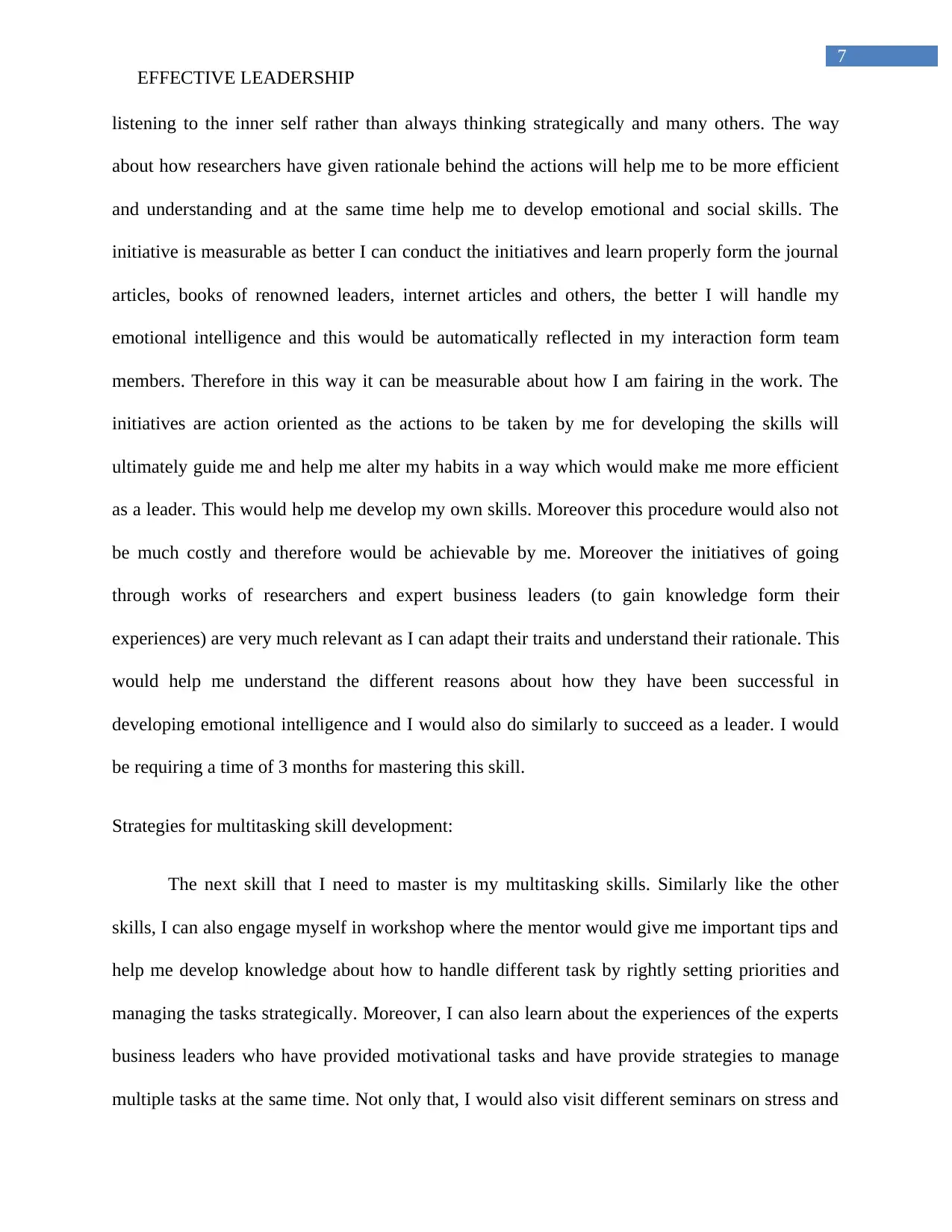
7
EFFECTIVE LEADERSHIP
listening to the inner self rather than always thinking strategically and many others. The way
about how researchers have given rationale behind the actions will help me to be more efficient
and understanding and at the same time help me to develop emotional and social skills. The
initiative is measurable as better I can conduct the initiatives and learn properly form the journal
articles, books of renowned leaders, internet articles and others, the better I will handle my
emotional intelligence and this would be automatically reflected in my interaction form team
members. Therefore in this way it can be measurable about how I am fairing in the work. The
initiatives are action oriented as the actions to be taken by me for developing the skills will
ultimately guide me and help me alter my habits in a way which would make me more efficient
as a leader. This would help me develop my own skills. Moreover this procedure would also not
be much costly and therefore would be achievable by me. Moreover the initiatives of going
through works of researchers and expert business leaders (to gain knowledge form their
experiences) are very much relevant as I can adapt their traits and understand their rationale. This
would help me understand the different reasons about how they have been successful in
developing emotional intelligence and I would also do similarly to succeed as a leader. I would
be requiring a time of 3 months for mastering this skill.
Strategies for multitasking skill development:
The next skill that I need to master is my multitasking skills. Similarly like the other
skills, I can also engage myself in workshop where the mentor would give me important tips and
help me develop knowledge about how to handle different task by rightly setting priorities and
managing the tasks strategically. Moreover, I can also learn about the experiences of the experts
business leaders who have provided motivational tasks and have provide strategies to manage
multiple tasks at the same time. Not only that, I would also visit different seminars on stress and
EFFECTIVE LEADERSHIP
listening to the inner self rather than always thinking strategically and many others. The way
about how researchers have given rationale behind the actions will help me to be more efficient
and understanding and at the same time help me to develop emotional and social skills. The
initiative is measurable as better I can conduct the initiatives and learn properly form the journal
articles, books of renowned leaders, internet articles and others, the better I will handle my
emotional intelligence and this would be automatically reflected in my interaction form team
members. Therefore in this way it can be measurable about how I am fairing in the work. The
initiatives are action oriented as the actions to be taken by me for developing the skills will
ultimately guide me and help me alter my habits in a way which would make me more efficient
as a leader. This would help me develop my own skills. Moreover this procedure would also not
be much costly and therefore would be achievable by me. Moreover the initiatives of going
through works of researchers and expert business leaders (to gain knowledge form their
experiences) are very much relevant as I can adapt their traits and understand their rationale. This
would help me understand the different reasons about how they have been successful in
developing emotional intelligence and I would also do similarly to succeed as a leader. I would
be requiring a time of 3 months for mastering this skill.
Strategies for multitasking skill development:
The next skill that I need to master is my multitasking skills. Similarly like the other
skills, I can also engage myself in workshop where the mentor would give me important tips and
help me develop knowledge about how to handle different task by rightly setting priorities and
managing the tasks strategically. Moreover, I can also learn about the experiences of the experts
business leaders who have provided motivational tasks and have provide strategies to manage
multiple tasks at the same time. Not only that, I would also visit different seminars on stress and
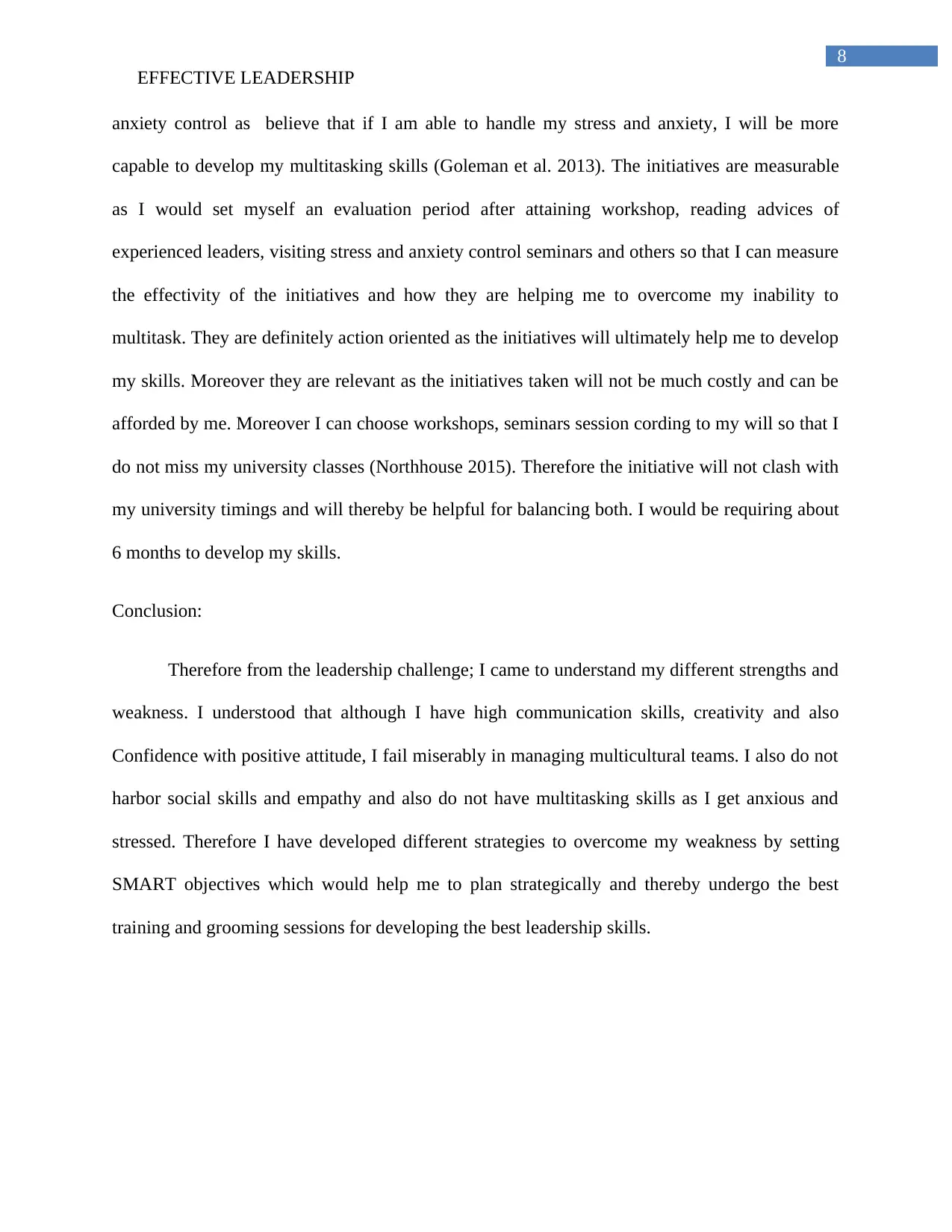
8
EFFECTIVE LEADERSHIP
anxiety control as believe that if I am able to handle my stress and anxiety, I will be more
capable to develop my multitasking skills (Goleman et al. 2013). The initiatives are measurable
as I would set myself an evaluation period after attaining workshop, reading advices of
experienced leaders, visiting stress and anxiety control seminars and others so that I can measure
the effectivity of the initiatives and how they are helping me to overcome my inability to
multitask. They are definitely action oriented as the initiatives will ultimately help me to develop
my skills. Moreover they are relevant as the initiatives taken will not be much costly and can be
afforded by me. Moreover I can choose workshops, seminars session cording to my will so that I
do not miss my university classes (Northhouse 2015). Therefore the initiative will not clash with
my university timings and will thereby be helpful for balancing both. I would be requiring about
6 months to develop my skills.
Conclusion:
Therefore from the leadership challenge; I came to understand my different strengths and
weakness. I understood that although I have high communication skills, creativity and also
Confidence with positive attitude, I fail miserably in managing multicultural teams. I also do not
harbor social skills and empathy and also do not have multitasking skills as I get anxious and
stressed. Therefore I have developed different strategies to overcome my weakness by setting
SMART objectives which would help me to plan strategically and thereby undergo the best
training and grooming sessions for developing the best leadership skills.
EFFECTIVE LEADERSHIP
anxiety control as believe that if I am able to handle my stress and anxiety, I will be more
capable to develop my multitasking skills (Goleman et al. 2013). The initiatives are measurable
as I would set myself an evaluation period after attaining workshop, reading advices of
experienced leaders, visiting stress and anxiety control seminars and others so that I can measure
the effectivity of the initiatives and how they are helping me to overcome my inability to
multitask. They are definitely action oriented as the initiatives will ultimately help me to develop
my skills. Moreover they are relevant as the initiatives taken will not be much costly and can be
afforded by me. Moreover I can choose workshops, seminars session cording to my will so that I
do not miss my university classes (Northhouse 2015). Therefore the initiative will not clash with
my university timings and will thereby be helpful for balancing both. I would be requiring about
6 months to develop my skills.
Conclusion:
Therefore from the leadership challenge; I came to understand my different strengths and
weakness. I understood that although I have high communication skills, creativity and also
Confidence with positive attitude, I fail miserably in managing multicultural teams. I also do not
harbor social skills and empathy and also do not have multitasking skills as I get anxious and
stressed. Therefore I have developed different strategies to overcome my weakness by setting
SMART objectives which would help me to plan strategically and thereby undergo the best
training and grooming sessions for developing the best leadership skills.

9
EFFECTIVE LEADERSHIP
References:
Carmeli, A., Gelbard, R. and Reiter‐Palmon, R., 2013. Leadership, creative problem‐solving
capacity, and creative performance: The importance of knowledge sharing. Human Resource
Management, 52(1), pp.95-121.
EFFECTIVE LEADERSHIP
References:
Carmeli, A., Gelbard, R. and Reiter‐Palmon, R., 2013. Leadership, creative problem‐solving
capacity, and creative performance: The importance of knowledge sharing. Human Resource
Management, 52(1), pp.95-121.
Secure Best Marks with AI Grader
Need help grading? Try our AI Grader for instant feedback on your assignments.
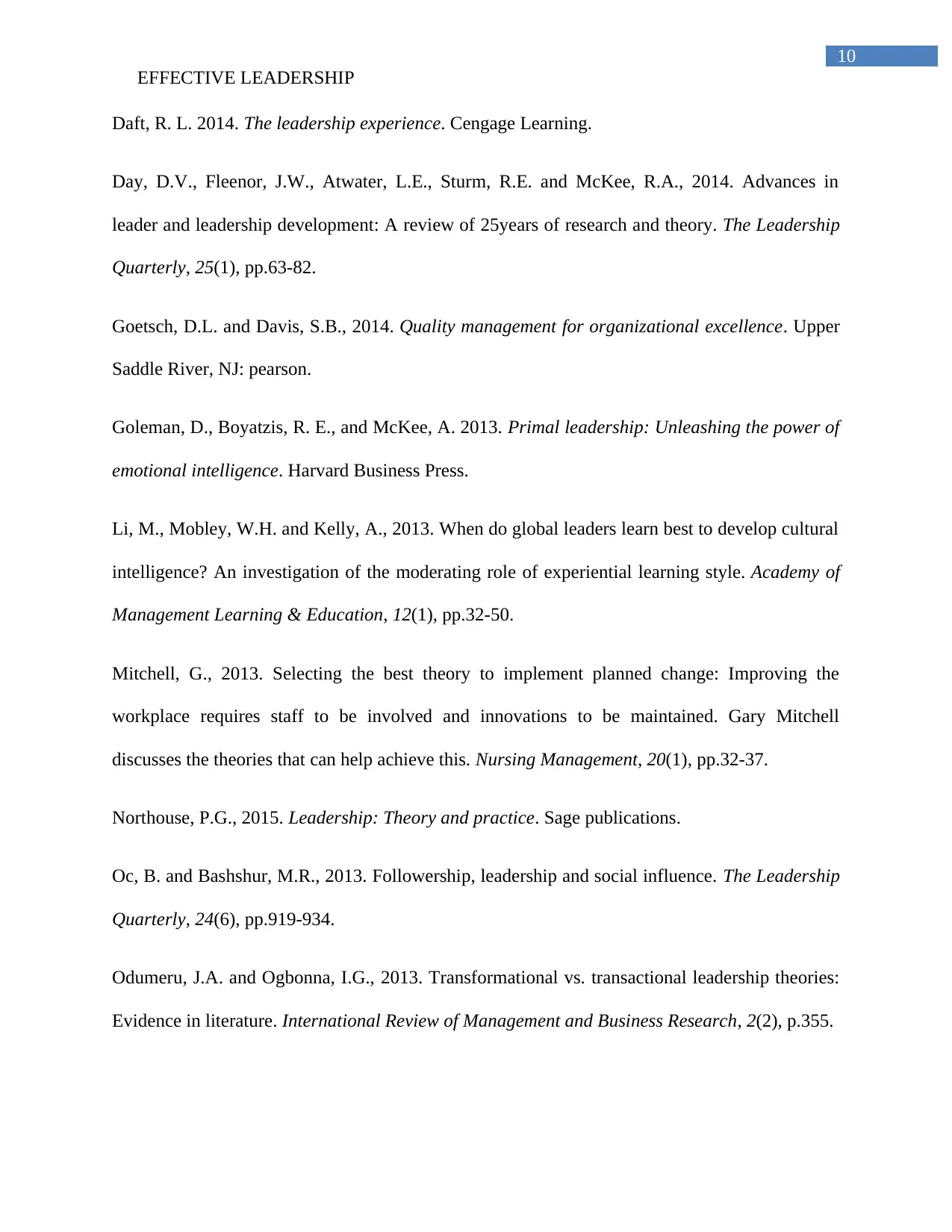
10
EFFECTIVE LEADERSHIP
Daft, R. L. 2014. The leadership experience. Cengage Learning.
Day, D.V., Fleenor, J.W., Atwater, L.E., Sturm, R.E. and McKee, R.A., 2014. Advances in
leader and leadership development: A review of 25years of research and theory. The Leadership
Quarterly, 25(1), pp.63-82.
Goetsch, D.L. and Davis, S.B., 2014. Quality management for organizational excellence. Upper
Saddle River, NJ: pearson.
Goleman, D., Boyatzis, R. E., and McKee, A. 2013. Primal leadership: Unleashing the power of
emotional intelligence. Harvard Business Press.
Li, M., Mobley, W.H. and Kelly, A., 2013. When do global leaders learn best to develop cultural
intelligence? An investigation of the moderating role of experiential learning style. Academy of
Management Learning & Education, 12(1), pp.32-50.
Mitchell, G., 2013. Selecting the best theory to implement planned change: Improving the
workplace requires staff to be involved and innovations to be maintained. Gary Mitchell
discusses the theories that can help achieve this. Nursing Management, 20(1), pp.32-37.
Northouse, P.G., 2015. Leadership: Theory and practice. Sage publications.
Oc, B. and Bashshur, M.R., 2013. Followership, leadership and social influence. The Leadership
Quarterly, 24(6), pp.919-934.
Odumeru, J.A. and Ogbonna, I.G., 2013. Transformational vs. transactional leadership theories:
Evidence in literature. International Review of Management and Business Research, 2(2), p.355.
EFFECTIVE LEADERSHIP
Daft, R. L. 2014. The leadership experience. Cengage Learning.
Day, D.V., Fleenor, J.W., Atwater, L.E., Sturm, R.E. and McKee, R.A., 2014. Advances in
leader and leadership development: A review of 25years of research and theory. The Leadership
Quarterly, 25(1), pp.63-82.
Goetsch, D.L. and Davis, S.B., 2014. Quality management for organizational excellence. Upper
Saddle River, NJ: pearson.
Goleman, D., Boyatzis, R. E., and McKee, A. 2013. Primal leadership: Unleashing the power of
emotional intelligence. Harvard Business Press.
Li, M., Mobley, W.H. and Kelly, A., 2013. When do global leaders learn best to develop cultural
intelligence? An investigation of the moderating role of experiential learning style. Academy of
Management Learning & Education, 12(1), pp.32-50.
Mitchell, G., 2013. Selecting the best theory to implement planned change: Improving the
workplace requires staff to be involved and innovations to be maintained. Gary Mitchell
discusses the theories that can help achieve this. Nursing Management, 20(1), pp.32-37.
Northouse, P.G., 2015. Leadership: Theory and practice. Sage publications.
Oc, B. and Bashshur, M.R., 2013. Followership, leadership and social influence. The Leadership
Quarterly, 24(6), pp.919-934.
Odumeru, J.A. and Ogbonna, I.G., 2013. Transformational vs. transactional leadership theories:
Evidence in literature. International Review of Management and Business Research, 2(2), p.355.
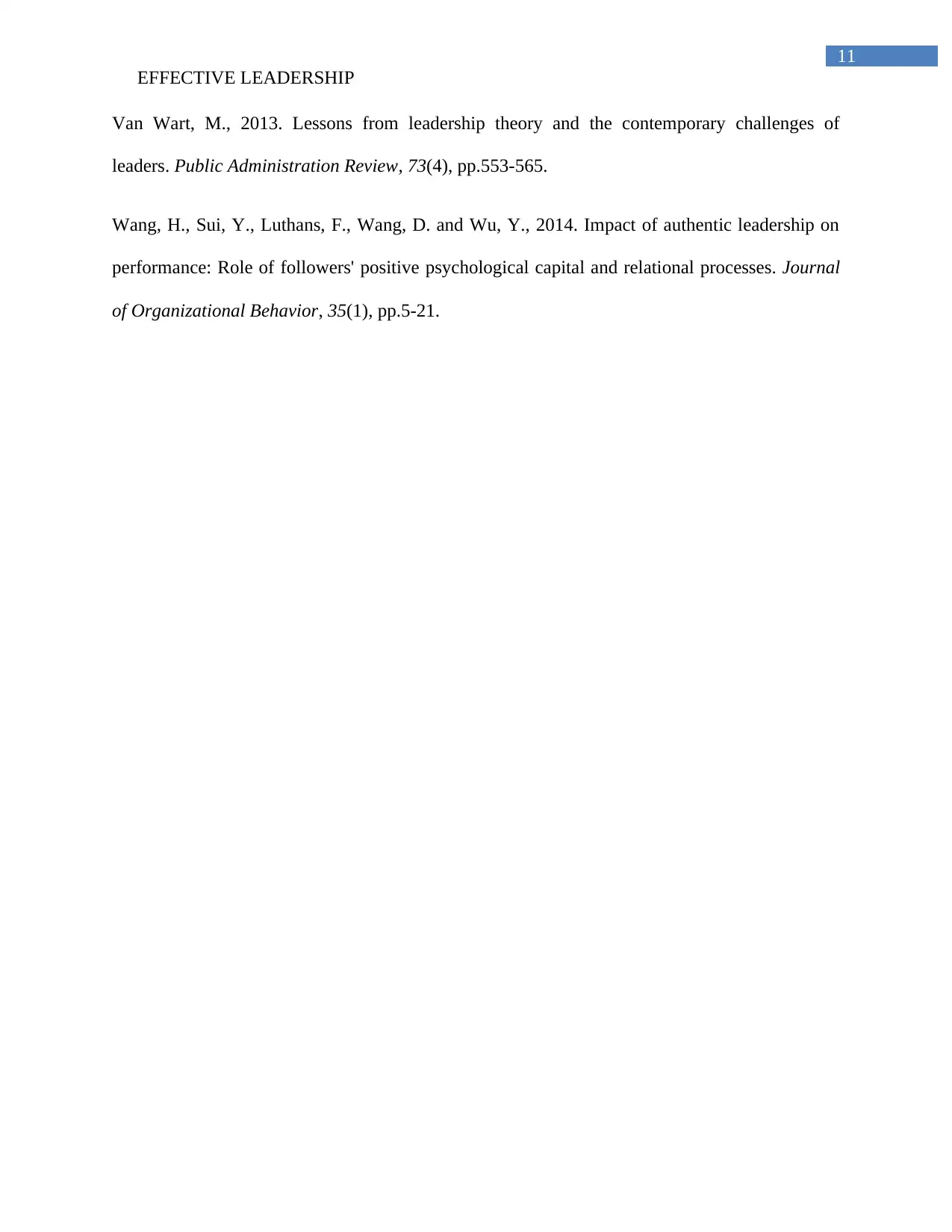
11
EFFECTIVE LEADERSHIP
Van Wart, M., 2013. Lessons from leadership theory and the contemporary challenges of
leaders. Public Administration Review, 73(4), pp.553-565.
Wang, H., Sui, Y., Luthans, F., Wang, D. and Wu, Y., 2014. Impact of authentic leadership on
performance: Role of followers' positive psychological capital and relational processes. Journal
of Organizational Behavior, 35(1), pp.5-21.
EFFECTIVE LEADERSHIP
Van Wart, M., 2013. Lessons from leadership theory and the contemporary challenges of
leaders. Public Administration Review, 73(4), pp.553-565.
Wang, H., Sui, Y., Luthans, F., Wang, D. and Wu, Y., 2014. Impact of authentic leadership on
performance: Role of followers' positive psychological capital and relational processes. Journal
of Organizational Behavior, 35(1), pp.5-21.
1 out of 12
Related Documents
Your All-in-One AI-Powered Toolkit for Academic Success.
+13062052269
info@desklib.com
Available 24*7 on WhatsApp / Email
![[object Object]](/_next/static/media/star-bottom.7253800d.svg)
Unlock your academic potential
© 2024 | Zucol Services PVT LTD | All rights reserved.





